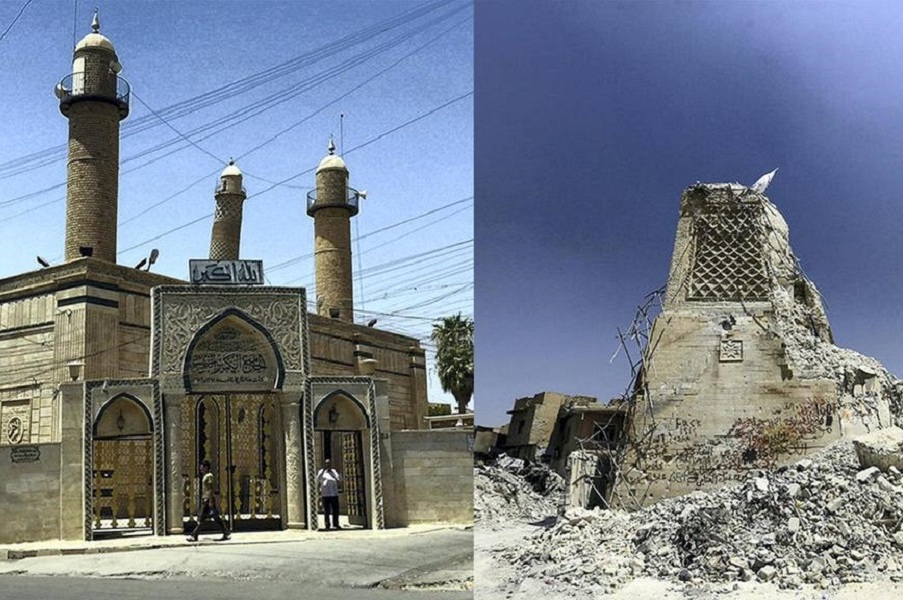The UAE will fund the rebuilding of the Great Mosque of Al Nuri, which was last year destroyed by ISIS in the northern Iraqi city of Mosul.
The Ministry of Culture has funded the UN’s heritage agency, Unesco, in a US$50.4 million (Dh185.1m) plan to rebuild the mosque, which was where ISIS leader Abu Bakr Al Baghdadi announced in 2014 that he had established a “caliphate” in Iraq and Syria.
The 800-year-old mosque, with its famous leaning minaret, was destroyed by the extremists as one of their last acts before Iraq’s second-largest city was liberated in June.
Its five-year restoration will be the UAE’s first major reconstruction project in Iraq and the flagship of Unesco’s Revive the Spirit of Mosul plan, announced in February, to rebuild the Old City.
The UAE will work closely in Mosul during the five-year process of restoration, which is expected to produce 1,000 jobs.
UAE Minister of Culture and Knowledge Development Noura Al Kaabi signed two memoranda of understanding in Baghdad, one with the Iraqi Ministry of Culture for Advanced Cultural Cooperation, and another with Unesco.
After touring the Iraq Museum in Baghdad, she said this project and the expanded cultural collaboration stems from strategic and historic ties with Iraq, adding that the revival of the Al Nuri mosque is part of "humanity’s heritage".
Giovanni Antonelli, a senior consultant for Unesco, said that the first year of the mosque project would be used to clear rubble and any bombs left inside by the extremists, document the area and conduct archaeological surveys.
Design and reconstruction afterwards will take four years.
“At the end there will be the creation of a memorial and the establishment of a museum to narrate this episode of destruction,” Mr Antonelli said.
In December 2016, at a conference hosted by Abu Dhabi at the Emirates Palace hotel, the UAE, France and Unesco announced a $100m fund, now called Aliph, to help to preserve endangered cultural heritage.
The first intentions for the fund were protecting heritage in the middle of conflict. But now that ISIS has been driven from most of Iraq and Syria, rebuilding the great sites of Mosul, Aleppo, Palmyra, Ninevah and others can begin.
The Great Mosque had deep importance to Mosul. The leaning minaret was popularly known as Al Hadba, or “the hunchback”, and the image of the mosque is on the Iraqi 10,000 dinar note.
It was one of the victims of ISIS’s sworn mission to destroy major heritage sites in the territories under its control. All that remains of Al Hadba is a three-storey structure.
Although the project is only beginning, Mr Antonelli said the co-ordinators expected to restore this building and, rather than rebuilding the old Hadba on top, build a new minaret next to it.
Whether the new minaret will keep Al Hadba’s distinctive lean is unclear. It was already listing in the 14th century when the famous explorer Ibn Battuta visited Mosul. The tower had its nickname even then.
It underwent repair work in the 1970s but was destabilised again during the Iran-Iraq war, when bombing burst underground pipes and caused flooding below the mosque.
In 2008, the minaret was leaning 2.4 metres from perpendicular and the crack that was forming between the bricks from the stress on the structure was big enough for a fist.
Imams had stopped climbing up the minaret to issue the call to prayer, but young children still ran up its steps to test their bravery.
The idea of replacing the minaret instead of completely restoring it is part of a major debate between two schools of city reconstruction.
Proponents of restoring sites hold that recreating destroyed buildings provides a sense of memory and continuity that is particularly important after a war.
Advocates of building new structures insist that restoration produces an inauthentic past and keeps architecture from representing modernity.
The National


Add new comment